List of republics
This is a list of republics. For antiquity (or later in the case of societies that did not refer to modern terminology to qualify their form of government) the assessment of whether a state organisation is a republic is based on retrospective analysis by historians and political theorists. For more recent systems of government, worldwide organisations with a broad political acceptance (such as the United Nations), can provide information on whether or not a sovereign state is referred to as a republic.
List by period
Antiquity
| State | Date of existence | Notes |
|---|---|---|
| Mahajanapada | c. 600 – c. 345 BC | A clan confederacy of two oligarchic republics and other states (kingdoms) in ancient India |
| Licchavis[1] | c. 600 – c. 345 BC | One of the eight confederate clans of the Vajji Clan Mahajanapada;[2] the city of Vaishali was the republic's capital.[3] |
| Roman Republic | 509–27 BC | |
| Classical Athens | 508–322 BC | Various Greek city-states under Classical Athenian influence; these loyalties and governments changed frequently (see synoecisms), and in some instances were even under the influence of Sparta without succumbing to oligarchy. |
| Ancient Carthage | 308–146 BC | In 308 BC, an attempted coup to restore the monarch to full power failed, which led to Carthage becoming a republic.[4] |
Middle Ages
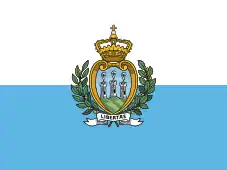 Most Serene Republic of San Marino (since 301, constitutional since 1600)
Most Serene Republic of San Marino (since 301, constitutional since 1600)- Qarmatians (899-1067)
- Gotland (?-1285)
- Upstalsboom League (c. 12th century–15th century)
 Icelandic Commonwealth (930–1262)
Icelandic Commonwealth (930–1262) Couto Misto (c. 1000 – 1868)
Couto Misto (c. 1000 – 1868)- Taifa of Córdoba (1031–1070)
 Republic of Florence (1115–1537)
Republic of Florence (1115–1537) Republic of Siena (1125–1557)
Republic of Siena (1125–1557).svg.png.webp) Novgorod Republic (1136–1478)[5]
Novgorod Republic (1136–1478)[5].svg.png.webp) Commune of Rome (1144–1193)
Commune of Rome (1144–1193) Most Serene Republic of Lucca (1160–1805)
Most Serene Republic of Lucca (1160–1805) Haudenosaunee (c. 13th century–1794)
Haudenosaunee (c. 13th century–1794)- Republic of Massa (1225-1336)
 Republic of Sassari (1275-1323)
Republic of Sassari (1275-1323) Old Swiss Confederacy (1291–1798)
Old Swiss Confederacy (1291–1798)- Republic of Poljica (1322–1806)
 Republic of Senarica (1343–1797)
Republic of Senarica (1343–1797) Pskov Republic (1348–1510)
Pskov Republic (1348–1510) Confederacy of Tlaxcala (1348–1520)
Confederacy of Tlaxcala (1348–1520)- Dithmarschen (c. 1400 – 1559)
 Republic of Cospaia (1440–1826)
Republic of Cospaia (1440–1826) Golden Ambrosian Republic (1447–1450)
Golden Ambrosian Republic (1447–1450)
Maritime republics
A maritime republic was a thalassocratic city-state during the Middle Ages in which the merchant class had considerable power.
 Most Serene Republic of Venice (697–1797)
Most Serene Republic of Venice (697–1797)- Republic of Gaeta (839–1140)
 Republic of Amalfi (839–1131)
Republic of Amalfi (839–1131)- Bajjāna (886-922)
.svg.png.webp) Republic of Ancona (c. 1000 – 1532)
Republic of Ancona (c. 1000 – 1532) Republic of Pisa (c. 1000 – 1406, 1494–1509)
Republic of Pisa (c. 1000 – 1406, 1494–1509)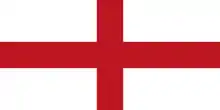 Most Serene Republic of Genoa (c. 1100 – 1797)
Most Serene Republic of Genoa (c. 1100 – 1797) Republic of Noli (1192–1797)
Republic of Noli (1192–1797) Republic of Ragusa (1358–1808)
Republic of Ragusa (1358–1808)
Free imperial cities
A free imperial city was a self-ruling city member of the Holy Roman Empire that was represented in the Imperial Diet.
 Free Imperial City of Worms (c. 11th century-1789)
Free Imperial City of Worms (c. 11th century-1789) Free Imperial City of Goslar (1081-1802)
Free Imperial City of Goslar (1081-1802) Free Imperial City of Aachen (1166-1801)
Free Imperial City of Aachen (1166-1801) Free Imperial City of Ulm (de jure: 1290-1803; de facto: 1184-1803)
Free Imperial City of Ulm (de jure: 1290-1803; de facto: 1184-1803) Free Imperial City of Besançon (1184-1654)
Free Imperial City of Besançon (1184-1654) Free Imperial City of Hamburg (1189-1806;)
Free Imperial City of Hamburg (1189-1806;) Free Imperial City of Konstanz (1192-1548)
Free Imperial City of Konstanz (1192-1548) Free Imperial City of Wetzlar (c. 12th century-1803)
Free Imperial City of Wetzlar (c. 12th century-1803) Free Imperial City of Friedberg (1211-1806)
Free Imperial City of Friedberg (1211-1806) Free Imperial City of Nördlingen (1215-1803)
Free Imperial City of Nördlingen (1215-1803)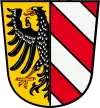 Free Imperial City of Nuremberg (1219-1806)
Free Imperial City of Nuremberg (1219-1806) Free Imperial City of Nordhausen (1220-1802)
Free Imperial City of Nordhausen (1220-1802) Free Imperial City of Pfullendorf (1220-1803)
Free Imperial City of Pfullendorf (1220-1803) Free Imperial City of Lübeck (1226–1811)
Free Imperial City of Lübeck (1226–1811) Free Imperial City of Rheinfelden (1225-1330)
Free Imperial City of Rheinfelden (1225-1330) Free Imperial City of Colmar (1226-1679)
Free Imperial City of Colmar (1226-1679) Free Imperial City of Esslingen (1229-1802/3)
Free Imperial City of Esslingen (1229-1802/3) Free Imperial City of Offenburg (c. 1240-1803)
Free Imperial City of Offenburg (c. 1240-1803) Free Imperial City of Reutlingen (1240-1803)
Free Imperial City of Reutlingen (1240-1803) Free Imperial City of Bopfingen (1241-1802)
Free Imperial City of Bopfingen (1241-1802) Free Imperial City of Mainz (1241-1462)
Free Imperial City of Mainz (1241-1462) Free Imperial City of Regensburg (1245-1486; 1496-1803)
Free Imperial City of Regensburg (1245-1486; 1496-1803) Free Imperial City of Schweinfurt (1245-1803)
Free Imperial City of Schweinfurt (1245-1803) Free Imperial City of Windsheim (1248-1802)
Free Imperial City of Windsheim (1248-1802) Free Imperial City of Buchau (c. 1250-1803)
Free Imperial City of Buchau (c. 1250-1803) Free Imperial City of Mühlhausen (1251-1803)
Free Imperial City of Mühlhausen (1251-1803) Free Imperial City of Strasbourg (1262-1681)
Free Imperial City of Strasbourg (1262-1681) Free Imperial City of Memmigen (1268-1802)
Free Imperial City of Memmigen (1268-1802) Free Imperial City of Rottweil (1268-1802)
Free Imperial City of Rottweil (1268-1802) Free Imperial City of Überlingen (1268-1803)
Free Imperial City of Überlingen (1268-1803)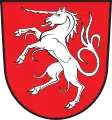 Free Imperial City of Gmünd (1268-1802)
Free Imperial City of Gmünd (1268-1802) Free Imperial City of Rothenburg (1274-1803)
Free Imperial City of Rothenburg (1274-1803) Free Imperial City of Buchhorn (1275-1803)
Free Imperial City of Buchhorn (1275-1803).png.webp) Free Imperial City of Lindau (1275-1802)
Free Imperial City of Lindau (1275-1802) Free Imperial City of Weil (1275-1803)
Free Imperial City of Weil (1275-1803) Free Imperial City of Augsburg (1276-1803)
Free Imperial City of Augsburg (1276-1803) Free Imperial City of Ravensburg (1276-1803)
Free Imperial City of Ravensburg (1276-1803) Free Imperial City of Hall (1280-1802)
Free Imperial City of Hall (1280-1802) Free Imperial City of Biberach an der Riß (1281-1803)
Free Imperial City of Biberach an der Riß (1281-1803) Free Imperial City of Kaufbeuren (1286-1803)
Free Imperial City of Kaufbeuren (1286-1803) Free Imperial City of Wangen (1286-1802)
Free Imperial City of Wangen (1286-1802) Free Imperial City of Cologne (1288-1801)
Free Imperial City of Cologne (1288-1801) Free Imperial City of Kempten (1289-1802/3)
Free Imperial City of Kempten (1289-1802/3) Free Imperial City of Dortmund (1293-1803)
Free Imperial City of Dortmund (1293-1803) Free Imperial City of Leutkirch (1293-1803)
Free Imperial City of Leutkirch (1293-1803) Free Imperial City of Speyer (1294-1792)
Free Imperial City of Speyer (1294-1792) Free Imperial City of Weißenburg (1296-1802)
Free Imperial City of Weißenburg (1296-1802) Free Imperial City of Zell am Harmersbach (c. 14th century-1803)
Free Imperial City of Zell am Harmersbach (c. 14th century-1803) Free Imperial City of Wimpfen (c. 1300-1803)
Free Imperial City of Wimpfen (c. 1300-1803) Free Imperial City of Donauwörth (1308-1607)
Free Imperial City of Donauwörth (1308-1607) Free Imperial City of Mühlhausen (1347–1798)
Free Imperial City of Mühlhausen (1347–1798) Free Imperial City of Dinkelsbühl (1351-1802)
Free Imperial City of Dinkelsbühl (1351-1802) Free Imperial City of Aalen (1360-1803)
Free Imperial City of Aalen (1360-1803) Free Imperial City of Gengenbach (1360-1803)
Free Imperial City of Gengenbach (1360-1803) Free Imperial City of Isny (1365-1803)
Free Imperial City of Isny (1365-1803) Free Imperial City of Bremen (de jure: 1654-1811; de facto: 1366-1811)
Free Imperial City of Bremen (de jure: 1654-1811; de facto: 1366-1811) Free Imperial City of Heilbronn (1371-1802)
Free Imperial City of Heilbronn (1371-1802)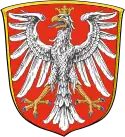 Free Imperial City of Frankfurt (1372-1806)
Free Imperial City of Frankfurt (1372-1806) Free Imperial City of Giengen (1391-1803)
Free Imperial City of Giengen (1391-1803) Free Imperial City of Diessenhofen (1415-1460)
Free Imperial City of Diessenhofen (1415-1460) Republic of Gersau (1433–1798)
Republic of Gersau (1433–1798) Free Imperial City of Soest (1449-1616)
Free Imperial City of Soest (1449-1616)
Early modernity
- Zaporizhian Sich (1552–1775)
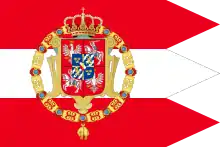 Polish–Lithuanian Commonwealth (1569–1795)
Polish–Lithuanian Commonwealth (1569–1795)
 Dutch Republic (1581–1795)
Dutch Republic (1581–1795)
- Saint-Malo (1590–1594)
.svg.png.webp) Republic of Salé (1619–1668)
Republic of Salé (1619–1668)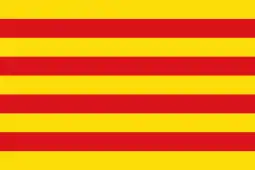 Catalan Republic (1641)
Catalan Republic (1641) Cossack Hetmanate (1649–1764)
Cossack Hetmanate (1649–1764) Commonwealth of England (1649–1660)
Commonwealth of England (1649–1660) Republic of Pirates (1706–1718)
Republic of Pirates (1706–1718)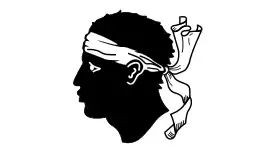 Corsican Republic (1755–1769)[6]
Corsican Republic (1755–1769)[6]- Republic of Paulava (1769–1795)
 United States of America (since 1776, constitutional since 1789)
United States of America (since 1776, constitutional since 1789) Lanfang Republic (1777–1884)
Lanfang Republic (1777–1884) Vermont Republic (1777–1791)[7]
Vermont Republic (1777–1791)[7].svg.png.webp) First French Republic (1792–1804)
First French Republic (1792–1804) Republic of Swellendam (1795)
Republic of Swellendam (1795) Republic of Graaff-Reinet (1795–1796)
Republic of Graaff-Reinet (1795–1796).svg.png.webp) State of Muskogee (1799–1803)
State of Muskogee (1799–1803)
Sister republics
A sister republic was a client state of France established by French armies or by local revolutionaries and assisted by the First French Republic during the French Revolutionary Wars.
 Republic of Liège (1789–1791)
Republic of Liège (1789–1791) United Belgian States (1790)
United Belgian States (1790)- Rauracian Republic (1792–1793)
 Republic of Mainz (1793)
Republic of Mainz (1793) Republic of Bouillon (1794–1795)
Republic of Bouillon (1794–1795) Batavian Republic (1795–1806)
Batavian Republic (1795–1806) Republic of Alba (1796)
Republic of Alba (1796)- Bolognese Republic (1796)
- Republic of Reggio (1796)
 Cispadane Republic (1796–1797)
Cispadane Republic (1796–1797) Transpadane Republic (1796–1797)
Transpadane Republic (1796–1797)- Republic of Asti (1797)
- Republic of Bergamo (1797)
- Republic of Brescia (1797)
 Republic of Crema (1797)
Republic of Crema (1797) Anconine Republic (1797–1798)
Anconine Republic (1797–1798)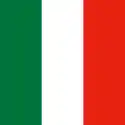 Cisalpine Republic (1797–1802)
Cisalpine Republic (1797–1802) Cisrhenian Republic (1797–1802)
Cisrhenian Republic (1797–1802) Ligurian Republic (1797–1805)
Ligurian Republic (1797–1805)- Lemanic Republic (1798)
.svg.png.webp) Tiberina Republic (1798)
Tiberina Republic (1798)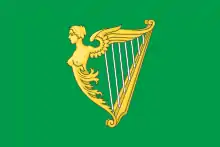 Republic of Connacht (1798)
Republic of Connacht (1798) Piedmontese Republic (1798–1799)
Piedmontese Republic (1798–1799).svg.png.webp) Helvetic Republic (1798–1802)
Helvetic Republic (1798–1802) Roman Republic (1798–1799)
Roman Republic (1798–1799) Republic of Pescara (1799)
Republic of Pescara (1799)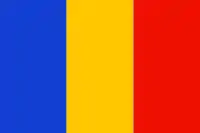 Parthenopean Republic (1799)
Parthenopean Republic (1799).PNG.webp) Republic of Lucca (1799–1805)
Republic of Lucca (1799–1805) Subalpine Republic (1800–1802)
Subalpine Republic (1800–1802).svg.png.webp) Italian Republic (1802–1805)
Italian Republic (1802–1805) Rhodanic Republic (1802–1810)
Rhodanic Republic (1802–1810) Swiss Confederation (1803–1815)
Swiss Confederation (1803–1815) Republic of Ragusa (1806–1808)
Republic of Ragusa (1806–1808) Free City of Danzig (1807–1814)
Free City of Danzig (1807–1814)
19th century
Africa
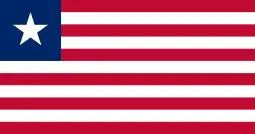 Republic of Liberia (since 1847)
Republic of Liberia (since 1847) Republic of Maryland (1853–1857)
Republic of Maryland (1853–1857)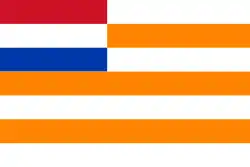 Orange Free State (1854–1902)
Orange Free State (1854–1902) South African Republic (1856–1877; 1881–1902)
South African Republic (1856–1877; 1881–1902)
North America
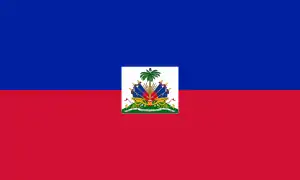 First Republic of Haiti (1806–1811)
First Republic of Haiti (1806–1811).svg.png.webp) State of Haiti (1810–1811)
State of Haiti (1810–1811) Republic of West Florida (1810)
Republic of West Florida (1810) Republic of East Florida (1812)
Republic of East Florida (1812) Republic of the Floridas (1817)
Republic of the Floridas (1817)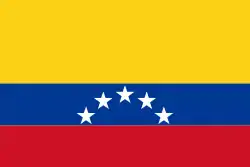 Republic of Spanish Haiti (1821-1822)
Republic of Spanish Haiti (1821-1822) Federal Republic of Central America (1823–1841)
Federal Republic of Central America (1823–1841)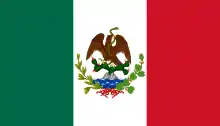 First Mexican United States (1824-1835)
First Mexican United States (1824-1835)- Republic of Madawaska (1827)
- Republic of Indian Stream (1832–1835)
 Centralist Republic of Mexico (1835-1846)
Centralist Republic of Mexico (1835-1846).svg.png.webp) Republic of Texas (1836–1845)
Republic of Texas (1836–1845) Republic of Canada (1837–1838)
Republic of Canada (1837–1838) State of Los Altos (1838–1840; 1848–1849)
State of Los Altos (1838–1840; 1848–1849).svg.png.webp) Republic of Lower Canada (1838)
Republic of Lower Canada (1838).svg.png.webp) Free State of Costa Rica (1838-1847)
Free State of Costa Rica (1838-1847).svg.png.webp) Republic of Honduras (1838-1896)
Republic of Honduras (1838-1896).svg.png.webp) Republic of Nicaragua (1838-1896)
Republic of Nicaragua (1838-1896) Republic of the Rio Grande (1840)
Republic of the Rio Grande (1840)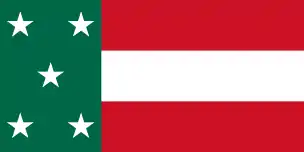 Republic of Yucatán (1840–1843; 1846–1848)
Republic of Yucatán (1840–1843; 1846–1848)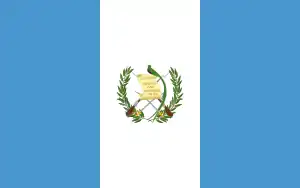 Republic of Guatemala (since 1840)
Republic of Guatemala (since 1840).svg.png.webp) Republic of El Salvador (1841-1896)
Republic of El Salvador (1841-1896) First Dominican Republic (1844–1861)
First Dominican Republic (1844–1861)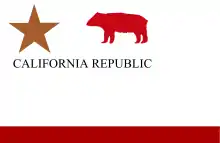 California Republic (June–July 1846)
California Republic (June–July 1846) Second Mexican United States (1846-1863)
Second Mexican United States (1846-1863).svg.png.webp) First Costa Rican Republic (1848-1948)
First Costa Rican Republic (1848-1948) State of Deseret (1849–1850)
State of Deseret (1849–1850)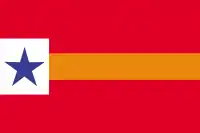 Republic of Baja California (15 October 1853-January 1854)
Republic of Baja California (15 October 1853-January 1854)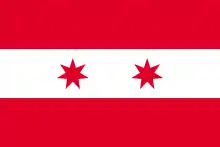 Republic of Sonora (15 October 1853 – 8 May 1854)
Republic of Sonora (15 October 1853 – 8 May 1854) Second Republic of Haiti (since 1859)
Second Republic of Haiti (since 1859).svg.png.webp) Confederate States of America (1860–1865)
Confederate States of America (1860–1865)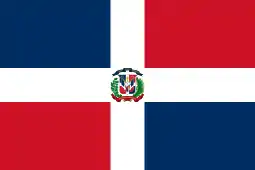 Second Dominican Republic (1865-1916)
Second Dominican Republic (1865-1916) United States of Mexico (since 1867)
United States of Mexico (since 1867)- Republic of Manitobah (1867–1869)
.svg.png.webp) United States of Central America (1896–1898)
United States of Central America (1896–1898)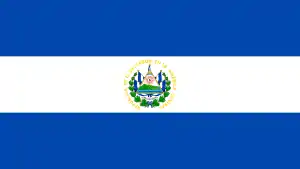 Republic of El Salvador (since 1898)
Republic of El Salvador (since 1898) Republic of Honduras (since 1898)
Republic of Honduras (since 1898)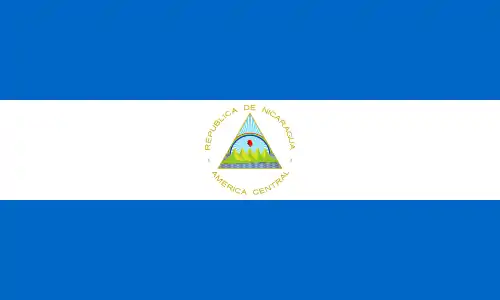 Republic of Nicaragua (since 1898)
Republic of Nicaragua (since 1898)
South America
 Republic of Paraguay (since 1811)
Republic of Paraguay (since 1811).svg.png.webp) American Confederation of Venezuela (1811-1819)
American Confederation of Venezuela (1811-1819).svg.png.webp) United Provinces of the Rio de la Plata (1816-1831)
United Provinces of the Rio de la Plata (1816-1831) Republic of Chile (since 1818)
Republic of Chile (since 1818) Republic of Gran Colombia (1819-1831)
Republic of Gran Colombia (1819-1831) Free Province of Guayaquil (1820-1829)
Free Province of Guayaquil (1820-1829)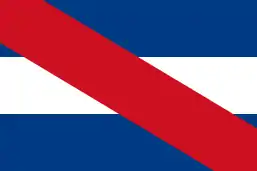 Republic of Entre Ríos (1820–1821)
Republic of Entre Ríos (1820–1821)- Republic of Tucumán (1820-1821)
.svg.png.webp) Republic of Peru (1824-1836)
Republic of Peru (1824-1836).svg.png.webp) Republic of Bolivia (1825-1836)
Republic of Bolivia (1825-1836)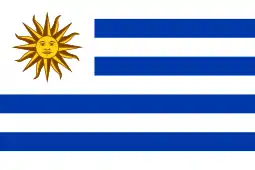 Oriental Republic of Uruguay (since 1828)
Oriental Republic of Uruguay (since 1828)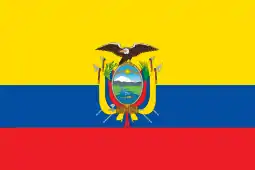 Republic of Ecuador (since 1830)
Republic of Ecuador (since 1830).svg.png.webp) State of Venezuela (1830-1864)
State of Venezuela (1830-1864) Argentine Confederation (1831-1861)
Argentine Confederation (1831-1861) Republic of New Granada (1831-1858)
Republic of New Granada (1831-1858)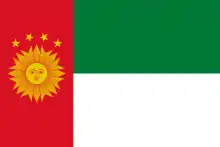 Republic of South Peru (1836)
Republic of South Peru (1836).svg.png.webp) Republic of North Peru (1836)
Republic of North Peru (1836)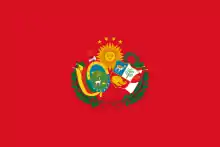 Peru–Bolivian Confederation (1836–1839)
Peru–Bolivian Confederation (1836–1839) Riograndense Republic (1836–1845)
Riograndense Republic (1836–1845).svg.png.webp) Juliana Republic (1839)
Juliana Republic (1839).svg.png.webp) Republic of Peru (since 1839)
Republic of Peru (since 1839).svg.png.webp) Republic of Bolivia (1839-2009)
Republic of Bolivia (1839-2009) State of Buenos Aires (1852-1861)
State of Buenos Aires (1852-1861) Granadine Confederation (1858-1863)
Granadine Confederation (1858-1863) Argentine Republic (since 1861)
Argentine Republic (since 1861) United States of Colombia (1863-1886)
United States of Colombia (1863-1886).svg.png.webp) United States of Venezuela (1864-1953)
United States of Venezuela (1864-1953) Republic of Colombia (since 1886)
Republic of Colombia (since 1886).svg.png.webp) Republic of Independent Guiana (20 July 1886–1891)
Republic of Independent Guiana (20 July 1886–1891).svg.png.webp) Republic of the United States of Brazil (1889-1930)
Republic of the United States of Brazil (1889-1930)
Asia
 Republic of Ezo (1868–1869)
Republic of Ezo (1868–1869) Republic of Formosa (1895)
Republic of Formosa (1895) Republic of Biak-na-Bato (1897)
Republic of Biak-na-Bato (1897).svg.png.webp) First Philippine Republic (1898–1901)
First Philippine Republic (1898–1901)
Europe
 Septinsular Republic (1800–1815)
Septinsular Republic (1800–1815) Republic of Gersau (1814-1818)
Republic of Gersau (1814-1818) Republic of Genoa (1814–1815)
Republic of Genoa (1814–1815) Swiss Confederation (1814-1848)
Swiss Confederation (1814-1848)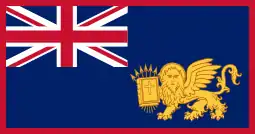 United States of the Ionian Islands (1815–1864)
United States of the Ionian Islands (1815–1864) Free City of Krakow (1815–1846)
Free City of Krakow (1815–1846)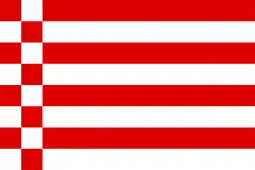 Free City of Bremen (1815–1871)
Free City of Bremen (1815–1871) Free City of Hamburg (1815–1871)
Free City of Hamburg (1815–1871) Free City of Lübeck (1815–1871)
Free City of Lübeck (1815–1871) Free City of Frankfurt (1816-1866)
Free City of Frankfurt (1816-1866) Neutral Moresnet (1816–1920)
Neutral Moresnet (1816–1920).svg.png.webp) First Hellenic Republic (1828–1832)
First Hellenic Republic (1828–1832) Second French Republic (1848–1852)
Second French Republic (1848–1852).svg.png.webp) Swiss Confederation (since 1848)
Swiss Confederation (since 1848)- Free Cities of Menton and Roquebrune (1848–1861)
.svg.png.webp) Roman Republic (February–April 1849)
Roman Republic (February–April 1849) Republic of San Marco (March 1848-August 1849)
Republic of San Marco (March 1848-August 1849) Third French Republic (1871–1940)
Third French Republic (1871–1940)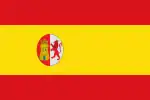 First Spanish Republic (1873–1874)
First Spanish Republic (1873–1874) Cantons of Alcoy, Algeciras, Alicante, Almansa, Andújar, Bailén, Béjar, Cadiz, Camuñas, Castellón, Córdoba, Granada, Gualchos, Huelva, Jaén, Jumilla, Loja, Málaga, Motril, Murcia, Orihuela, Plasencia, Salamanca, San Fernando, Sevilla, Tarifa, Torrevieja, Valencia (1873) and Cartagena (1873-1874)
Cantons of Alcoy, Algeciras, Alicante, Almansa, Andújar, Bailén, Béjar, Cadiz, Camuñas, Castellón, Córdoba, Granada, Gualchos, Huelva, Jaén, Jumilla, Loja, Málaga, Motril, Murcia, Orihuela, Plasencia, Salamanca, San Fernando, Sevilla, Tarifa, Torrevieja, Valencia (1873) and Cartagena (1873-1874)- Republic of Tamrash (1878–1886)
Oceania
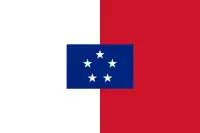 Independent Commune of Franceville (1889)[8]
Independent Commune of Franceville (1889)[8]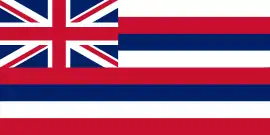 Republic of Hawai'i (1894–1898)
Republic of Hawai'i (1894–1898)
20th century
Africa
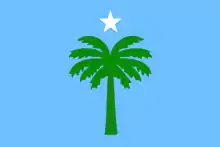 Tripolitanian Republic (16 November 1918–1922)
Tripolitanian Republic (16 November 1918–1922) Confederal Republic of the Tribes of the Rif (18 September 1921 – 27 May 1926)
Confederal Republic of the Tribes of the Rif (18 September 1921 – 27 May 1926) Arab Republic of Egypt (since 18 June 1953)
Arab Republic of Egypt (since 18 June 1953) Sudan (since 1956)
Sudan (since 1956) First Republic of Tunisia (25 July 1957 – 10 February 2014)
First Republic of Tunisia (25 July 1957 – 10 February 2014)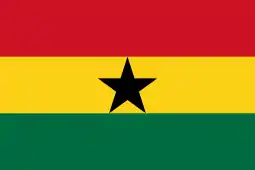 Ghana (since 1960)
Ghana (since 1960)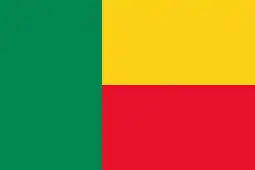 Benin (since 1960)
Benin (since 1960) Madagascar (since 1960)
Madagascar (since 1960)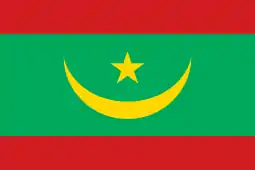 Mauritania (since 1960)
Mauritania (since 1960) Nigeria (since 1963)
Nigeria (since 1963) Somalia (since 1960)
Somalia (since 1960)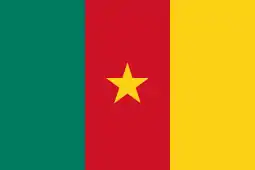 Cameroon (since 1961)
Cameroon (since 1961)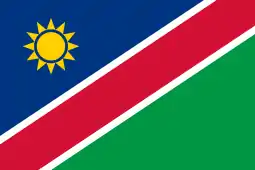 Namibia (since 1990)
Namibia (since 1990) Sierra Leone (since 1971)
Sierra Leone (since 1971) South Africa (since 1961)
South Africa (since 1961) Burundi (since 1966)
Burundi (since 1966).svg.png.webp) Rhodesia (2 March 1970 – 11 December 1979)
Rhodesia (2 March 1970 – 11 December 1979)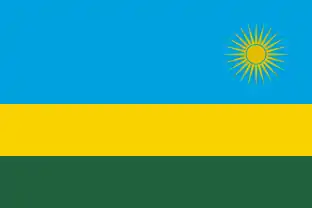 Rwanda (since 1962)
Rwanda (since 1962)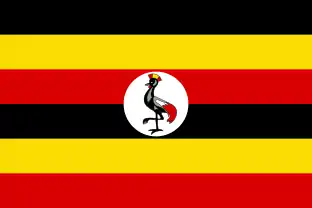 Uganda (since 1963)
Uganda (since 1963)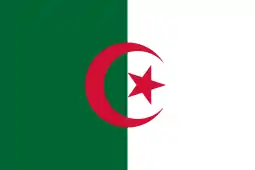 People's Democratic Republic of Algeria (since 5 July 1962)
People's Democratic Republic of Algeria (since 5 July 1962).svg.png.webp) Republic of Tanganyika (9 December 1962 – 26 April 1964)
Republic of Tanganyika (9 December 1962 – 26 April 1964)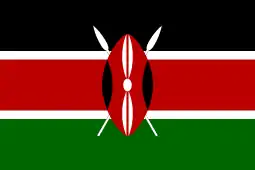 Kenya (since 1963)
Kenya (since 1963)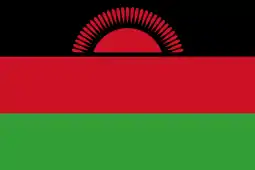 Malawi (since 1964)
Malawi (since 1964)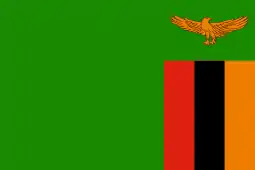 Zambia (since 1964)
Zambia (since 1964).svg.png.webp) People's Republic of Zanzibar and Pemba (12 January 1964 – 26 April 1964)
People's Republic of Zanzibar and Pemba (12 January 1964 – 26 April 1964)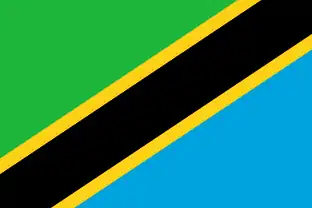 Tanzania (since 26 April 1964)
Tanzania (since 26 April 1964)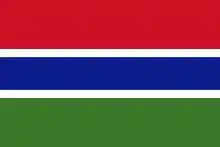 Gambia (since 1965)
Gambia (since 1965) Botswana (since 1966)
Botswana (since 1966)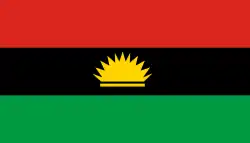 Biafra (30 May 1967 – 15 January 1970)
Biafra (30 May 1967 – 15 January 1970)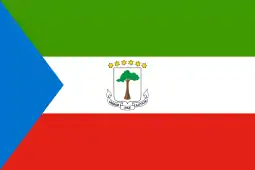 Equatorial Guinea (since 1968)
Equatorial Guinea (since 1968).svg.png.webp) Libyan Arab Republic (1 September 1969 – 2 March 1977)
Libyan Arab Republic (1 September 1969 – 2 March 1977) Central African Republic (since 1970)
Central African Republic (since 1970)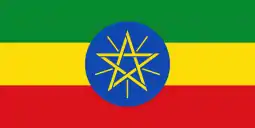 Ethiopia (since 1974)
Ethiopia (since 1974) Western Sahara (since 1976)
Western Sahara (since 1976) Seychelles (since 1976)
Seychelles (since 1976).svg.png.webp) Great Socialist People's Libyan Arab Jamahiriya (2 March 1977 – 28 August 2011)
Great Socialist People's Libyan Arab Jamahiriya (2 March 1977 – 28 August 2011)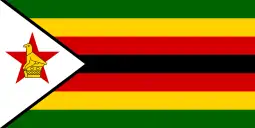 Zimbabwe (since 1980)
Zimbabwe (since 1980)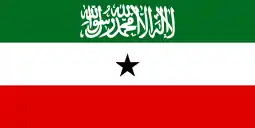 Somaliland (since 1991)
Somaliland (since 1991) Mauritius (since 1992)
Mauritius (since 1992)
America
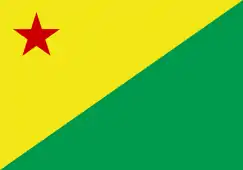 Republic of Acre (1st: 15 July 1899 – 15 March 1900; 2nd: November 1900–24 December 1900 3rd: 27 January 1903 – 11 November 1903)
Republic of Acre (1st: 15 July 1899 – 15 March 1900; 2nd: November 1900–24 December 1900 3rd: 27 January 1903 – 11 November 1903)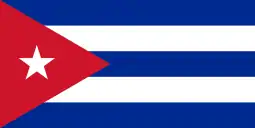 Republic of Cuba (since 20 May 1902)
Republic of Cuba (since 20 May 1902) Republic of Panama (since 3 November 1903)
Republic of Panama (since 3 November 1903).svg.png.webp) First United States of Brazil (16 July 1934 – 29 October 1945)
First United States of Brazil (16 July 1934 – 29 October 1945).svg.png.webp) Second United States of Brazil (31 January 1946 – 31 March 1964)
Second United States of Brazil (31 January 1946 – 31 March 1964).svg.png.webp) Second Republic of Costa Rica (since 7 November 1949)
Second Republic of Costa Rica (since 7 November 1949) Third Dominican Republic (1924-12 July 1965)
Third Dominican Republic (1924-12 July 1965).svg.png.webp) Republic of Venezuela (11 April 1953 – 15 December 1999)
Republic of Venezuela (11 April 1953 – 15 December 1999) Fourth Dominican Republic (since 1 July 1966)
Fourth Dominican Republic (since 1 July 1966).svg.png.webp) Republic of Anguilla (12 July 1967 – 19 March 1969)
Republic of Anguilla (12 July 1967 – 19 March 1969)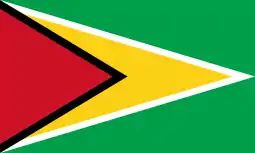 Co-operative Republic of Guyana (since 23 February 1970)
Co-operative Republic of Guyana (since 23 February 1970)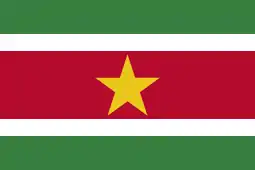 Republic of Suriname (since 25 November 1975)
Republic of Suriname (since 25 November 1975) Republic of Trinidad and Tobago (since 1 August 1976)
Republic of Trinidad and Tobago (since 1 August 1976)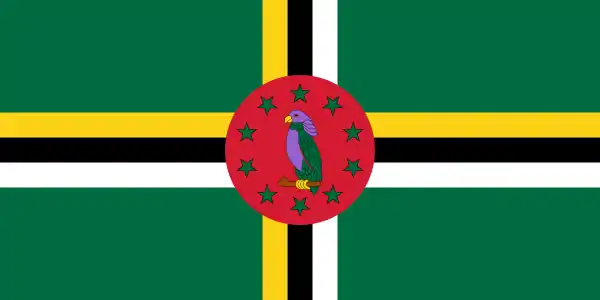 Commonwealth of Dominica (since 3 November 1978)
Commonwealth of Dominica (since 3 November 1978) Federative Republic of Brazil (since 15 March 1985)
Federative Republic of Brazil (since 15 March 1985).svg.png.webp) Bolivarian Republic of Venezuela (since 15 December 1999)
Bolivarian Republic of Venezuela (since 15 December 1999)
Asia
- Urjanchai Republic (1 December 1911 – 17 April 1914)
 Republic of China (since 1 January 1912, since 7 December 1949 only in Taiwan)
Republic of China (since 1 January 1912, since 7 December 1949 only in Taiwan) Transcaucasian Democratic Federative Republic (22 April 1918 – 28 May 1918)
Transcaucasian Democratic Federative Republic (22 April 1918 – 28 May 1918).svg.png.webp) Democratic Republic of Armenia (28 May 1918 – 2 December 1920)
Democratic Republic of Armenia (28 May 1918 – 2 December 1920).png.webp) Democratic Republic of Azerbaijan (28 May 1918 – 28 April 1920)
Democratic Republic of Azerbaijan (28 May 1918 – 28 April 1920) Kars Republic (1 December 1918 – 19 April 1919)
Kars Republic (1 December 1918 – 19 April 1919) Republic of Aras (December 1918 – Mid-June 1919)
Republic of Aras (December 1918 – Mid-June 1919).svg.png.webp) Azerbaijan Soviet Socialist Republic (28 April 1920 – 12 March 1922)
Azerbaijan Soviet Socialist Republic (28 April 1920 – 12 March 1922).svg.png.webp) Armenian Soviet Socialist Republic (2 December 1920 – 12 March 1922)
Armenian Soviet Socialist Republic (2 December 1920 – 12 March 1922).svg.png.webp) Republic of Mountainous Armenia (26 April 1921 – 13 July 1921)
Republic of Mountainous Armenia (26 April 1921 – 13 July 1921).svg.png.webp) Tuvan People's Republic (14 August 1921 – 11 October 1944)
Tuvan People's Republic (14 August 1921 – 11 October 1944) Republic of Turkey (since 29 October 1923)
Republic of Turkey (since 29 October 1923).svg.png.webp) Mongolian People's Republic (24 November 1924 – 13 February 1992)
Mongolian People's Republic (24 November 1924 – 13 February 1992).svg.png.webp) Commonwealth of the Philippines (15 November 1935 – 4 July 1946)
Commonwealth of the Philippines (15 November 1935 – 4 July 1946) Second Philippine Republic (14 November 1943 – 11 June 1945)
Second Philippine Republic (14 November 1943 – 11 June 1945)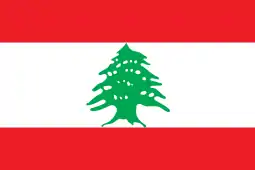 Lebanese Republic (de jure: since 22 November 1943; de facto: since 31 December 1946)
Lebanese Republic (de jure: since 22 November 1943; de facto: since 31 December 1946) Republic of Indonesia (since 17 August 1945)
Republic of Indonesia (since 17 August 1945)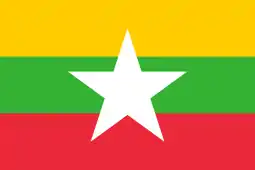 Republic of the Union of Myanmar (since 4 January 1948)
Republic of the Union of Myanmar (since 4 January 1948).svg.png.webp) Third Philippine Republic (4 July 1946 – 30 December 1965)
Third Philippine Republic (4 July 1946 – 30 December 1965) State of Israel (since 14 May 1948)
State of Israel (since 14 May 1948) South Korea (since 15 August 1948)
South Korea (since 15 August 1948) Democratic People's Republic of Korea (since 9 September 1948)
Democratic People's Republic of Korea (since 9 September 1948)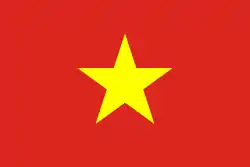 Vietnam (since 2 September 1945)
Vietnam (since 2 September 1945) People's Republic of China (since 1 October 1949)
People's Republic of China (since 1 October 1949) Republic of South Maluku (15 April 1950 – 12 April 1963)
Republic of South Maluku (15 April 1950 – 12 April 1963)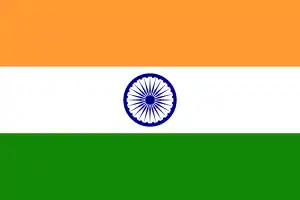 India (since 1950)
India (since 1950)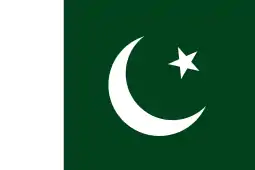 Pakistan (since 1956)
Pakistan (since 1956) Iraq (since 1958)
Iraq (since 1958)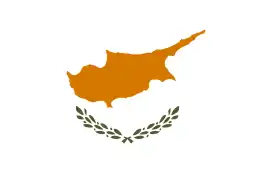 Cyprus (since 1960)
Cyprus (since 1960) Singapore (since 1965)
Singapore (since 1965).svg.png.webp) Fourth Philippine Republic (30 December 1965–22/25 February 1986)
Fourth Philippine Republic (30 December 1965–22/25 February 1986) Yemen (since 1967)
Yemen (since 1967)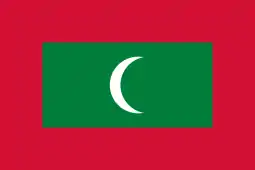 Maldives (since 1968)
Maldives (since 1968)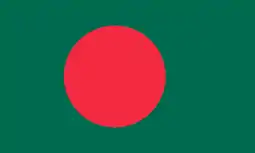 Bangladesh (since 1971)
Bangladesh (since 1971)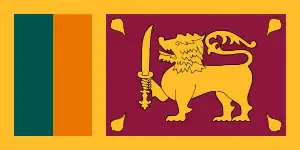 Sri Lanka (since 1972)
Sri Lanka (since 1972)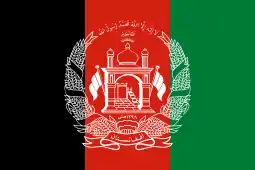 Afghanistan (since 1973)[9]
Afghanistan (since 1973)[9] Laos (since 1975)
Laos (since 1975)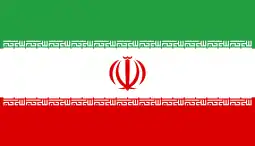 Iran (since 1979)
Iran (since 1979)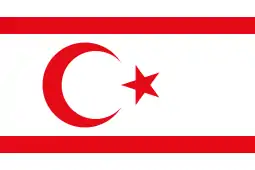 Northern Cyprus (since 1983)
Northern Cyprus (since 1983) Republic of the Philippines (since 22/25 February 1986)
Republic of the Philippines (since 22/25 February 1986) Palestine (since 1988)
Palestine (since 1988)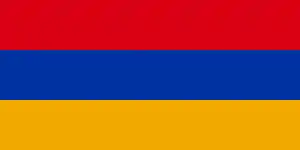 Armenia (since 1991)
Armenia (since 1991) Republic of Artsakh (since 1991)
Republic of Artsakh (since 1991) Georgia (since 1991)
Georgia (since 1991)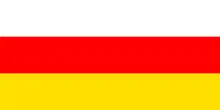 South Ossetia (since 1991)
South Ossetia (since 1991) Abkhazia (since 1992)
Abkhazia (since 1992) Mongolia (since 1992)
Mongolia (since 1992) Nepal (since 2008)
Nepal (since 2008)
Europe
 Kruševo Republic (3 August 1903 – 13 August 1903)
Kruševo Republic (3 August 1903 – 13 August 1903) First Portuguese Republic (5 October 1910 – 26 May 1926)
First Portuguese Republic (5 October 1910 – 26 May 1926) Independent Government of Western Thrace (31 August 1913 – 25 October 1913)
Independent Government of Western Thrace (31 August 1913 – 25 October 1913) Republic of Finland (since 6 December 1917)
Republic of Finland (since 6 December 1917) Russian Republic (1917)
Russian Republic (1917) Ukrainian People's Republic (25 January 1917 – 29 April 1918; 14 December 1918–18 March 1921)
Ukrainian People's Republic (25 January 1917 – 29 April 1918; 14 December 1918–18 March 1921) Mountainous Republic of the Northern Caucasus (11 May 1917–January 1921)
Mountainous Republic of the Northern Caucasus (11 May 1917–January 1921) Crimean People's Republic (13 December 1917–January 1918)
Crimean People's Republic (13 December 1917–January 1918)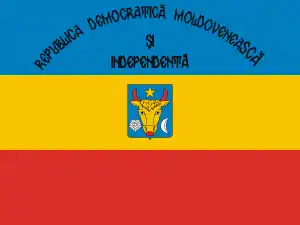 Moldavian Democratic Republic (6 February 1918 – 10 December 1918)
Moldavian Democratic Republic (6 February 1918 – 10 December 1918) Kuban People's Republic (16 February 1918 – 17 March 1920)
Kuban People's Republic (16 February 1918 – 17 March 1920).svg.png.webp) Belarusian People's Republic (9 March 1918–1919)
Belarusian People's Republic (9 March 1918–1919) Republic of Turkey (since 29 October 1923)
Republic of Turkey (since 29 October 1923) Lithuania (16 February 1918 – 3 August 1940)
Lithuania (16 February 1918 – 3 August 1940) Estonia (24 February 1918 – 6 August 1940)
Estonia (24 February 1918 – 6 August 1940) Don Republic (18 May 1918–1920)
Don Republic (18 May 1918–1920).svg.png.webp) Democratic Republic of Georgia (26 May 1918 – 25 April 1921)
Democratic Republic of Georgia (26 May 1918 – 25 April 1921) Commonwealth of Zakopane (13 October 1918 – 16 November 1918)
Commonwealth of Zakopane (13 October 1918 – 16 November 1918) West Ukrainian People's Republic (18 October 1918 – 22 January 1919)
West Ukrainian People's Republic (18 October 1918 – 22 January 1919) Komancza Republic (4 November 1918 – 24 January 1919)
Komancza Republic (4 November 1918 – 24 January 1919) Republic of Tarnobrzeg (6 November 1918–Spring 1919)
Republic of Tarnobrzeg (6 November 1918–Spring 1919).svg.png.webp) People's State of Bavaria (8 November 1918 – 6 April 1919)
People's State of Bavaria (8 November 1918 – 6 April 1919) Republic of German-Austria (12 November 1918 – 10 September 1919)
Republic of German-Austria (12 November 1918 – 10 September 1919) Second Polish Republic (16 November 1918 – 6 October 1939)
Second Polish Republic (16 November 1918 – 6 October 1939) Latvia (18 November 1918 – 5 August 1940)
Latvia (18 November 1918 – 5 August 1940) First Czechoslovak Republic (28 October 1918 – 30 September 1938)
First Czechoslovak Republic (28 October 1918 – 30 September 1938) Lemko-Rusyn People's Republic (5 December 1918–March 1920)
Lemko-Rusyn People's Republic (5 December 1918–March 1920) First Austrian Republic (10 September 1919 – 1 May 1934)
First Austrian Republic (10 September 1919 – 1 May 1934) Free State of Fiume (12 November 1920 – 22 February 1924)
Free State of Fiume (12 November 1920 – 22 February 1924)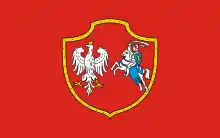 Republic of Central Lithuania (12 October 1920 – 24 March 1922)
Republic of Central Lithuania (12 October 1920 – 24 March 1922)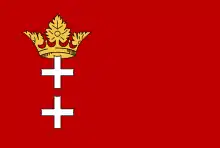 Free City of Danzig (15 November 1920 – 2 September 1939)
Free City of Danzig (15 November 1920 – 2 September 1939).svg.png.webp) Georgian Soviet Socialist Republic (25 February 1921 – 12 March 1922)
Georgian Soviet Socialist Republic (25 February 1921 – 12 March 1922) Union of Soviet Socialist Republics (1922-1991)
Union of Soviet Socialist Republics (1922-1991).svg.png.webp) Second Hellenic Republic (1924–1935)
Second Hellenic Republic (1924–1935) Catalan Republic (14 April 1931 – 17 April 1931)
Catalan Republic (14 April 1931 – 17 April 1931).svg.png.webp) Second Spanish Republic (de facto: 1931–1939; de jure: 1931–1975)
Second Spanish Republic (de facto: 1931–1939; de jure: 1931–1975) Ireland (since 29 December 1937)
Ireland (since 29 December 1937) Second Czechoslovak Republic (30 September 1938 – 15 March 1939)
Second Czechoslovak Republic (30 September 1938 – 15 March 1939) Carpatho-Ukraine (30 December 1938 – 18 March 1939)
Carpatho-Ukraine (30 December 1938 – 18 March 1939) Slovak State (14 March 1939 – 4 April 1945)
Slovak State (14 March 1939 – 4 April 1945) Fourth French Republic (1946–1958)
Fourth French Republic (1946–1958) Italian Republic (since 2 June 1946)
Italian Republic (since 2 June 1946) Albania (est. 1946)
Albania (est. 1946) Romania (est. 1947, communist government from 1948–1989)
Romania (est. 1947, communist government from 1948–1989) Fifth French Republic (since 1958)
Fifth French Republic (since 1958).svg.png.webp) Third Hellenic Republic (since 1974)
Third Hellenic Republic (since 1974) Malta (since 1974)
Malta (since 1974)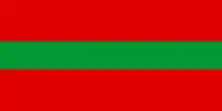 Transnistria (since 1990)
Transnistria (since 1990) Lithuania (since 11 March 1990)
Lithuania (since 11 March 1990) Estonia (since 20 August 1991)
Estonia (since 20 August 1991) Latvia (since 21 August 1991)
Latvia (since 21 August 1991)
Oceania
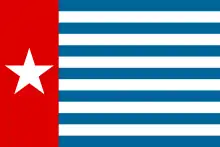 Republic of West Papua (1961–1963)
Republic of West Papua (1961–1963) Independent State of Samoa (since 1 January 1962)
Independent State of Samoa (since 1 January 1962) Republic of Nauru (since 31 January 1968)
Republic of Nauru (since 31 January 1968) Republic of Palau (since 2 April 1979)
Republic of Palau (since 2 April 1979) Republic of the Marshall Islands (since 1979)
Republic of the Marshall Islands (since 1979)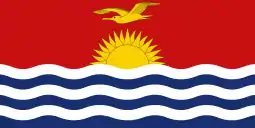 Republic of Kiribati (since 12 July 1979)
Republic of Kiribati (since 12 July 1979)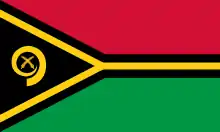 Republic of Vanuatu (since 30 July 1980)
Republic of Vanuatu (since 30 July 1980) Federated States of Micronesia (since 3 November 1986)
Federated States of Micronesia (since 3 November 1986) Republic of Fiji (since 7 October 1987)
Republic of Fiji (since 7 October 1987)
21st century and later
 Democratic Republic of Timor-Leste (since 20 May 2002)
Democratic Republic of Timor-Leste (since 20 May 2002).svg.png.webp) State of Anjouan (2008)
State of Anjouan (2008) Republic of Kosovo (since 17 February 2008)
Republic of Kosovo (since 17 February 2008) Federal Democratic Republic of Nepal (since 28 May 2008)
Federal Democratic Republic of Nepal (since 28 May 2008).svg.png.webp) Plurinational State of Bolivia (since 7 February 2009)
Plurinational State of Bolivia (since 7 February 2009)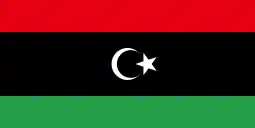 State of Libya (since 17 February 2011)
State of Libya (since 17 February 2011)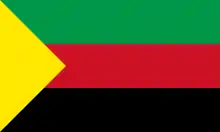 Azawad (2012-2013)
Azawad (2012-2013) United Federated States of Bangsamoro Republik (27 July 2013 – 28 September 2013)
United Federated States of Bangsamoro Republik (27 July 2013 – 28 September 2013) Autonomous Republic of Crimea (2014)
Autonomous Republic of Crimea (2014) Donetsk People's Republic (since 12 May 2014)
Donetsk People's Republic (since 12 May 2014) Lugansk People's Republic (since 12 May 2014)
Lugansk People's Republic (since 12 May 2014)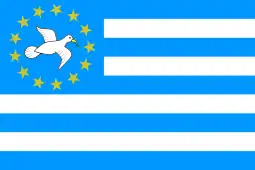 Federal Republic of Ambazonia (since 1 October 2017)
Federal Republic of Ambazonia (since 1 October 2017) Catalan Republic (10 October 2017)
Catalan Republic (10 October 2017)
List by type
In modern usage, a republican system of government is loosely applied to any state which claims this designation.[10] For example, the Dominican Republic under Rafael Trujillo is considered a republic, as is the Republic of Iraq under Saddam Hussein and The Union of Soviet Socialist Republics under Joseph Stalin. The Kingdom of Sweden (which in 2006 ranked highest in the Economist's index of democracy)[11] is not a republic, but the Democratic People's Republic of Korea (i.e. North Korea, which ranks lowest in the same survey) is.
Arab republics
 Arab Republic of Egypt (1953–present)
Arab Republic of Egypt (1953–present) Syrian Arab Republic (1946–present)
Syrian Arab Republic (1946–present) Sahrawi Arab Democratic Republic (1976–present)
Sahrawi Arab Democratic Republic (1976–present).svg.png.webp) United Arab Republic (1958–1971)
United Arab Republic (1958–1971) Yemen Arab Republic (1962–1990)
Yemen Arab Republic (1962–1990).svg.png.webp) Libyan Arab Republic (1969–1977)
Libyan Arab Republic (1969–1977)
Confederal republics
Confederal republics are associations of sovereign states, usually having power over critical common issues such as defense and foreign policy:
.svg.png.webp) Confederate States of America (1861–1865)
Confederate States of America (1861–1865)- Senegambia Confederation (1982–1989)
.svg.png.webp) United States of America (under the Second Continental Congress and the Articles of Confederation, 1776–1789)
United States of America (under the Second Continental Congress and the Articles of Confederation, 1776–1789)
Crowned republics
A crowned republic, is a form of constitutional monarchy where the monarch's role is commonly seen as largely ceremonial and where all the royal prerogatives are prescribed by custom and law in such a way that the monarch has limited discretion over governmental and constitutional issues.
 United Kingdom (1707–present)[12]
United Kingdom (1707–present)[12] Kingdom of Norway (1905–present)[13]
Kingdom of Norway (1905–present)[13].svg.png.webp) Commonwealth of Australia (1986–present)[12][14]
Commonwealth of Australia (1986–present)[12][14] Realm of New Zealand (1947–present)[12]
Realm of New Zealand (1947–present)[12].svg.png.webp) Canada (1982–present)[12]
Canada (1982–present)[12].svg.png.webp) Kingdom of Greece (1864–1967)[15][16]
Kingdom of Greece (1864–1967)[15][16].svg.png.webp) Union of South Africa[12] (1910–1961)
Union of South Africa[12] (1910–1961) Malaysia (1957-present)
Malaysia (1957-present)
Democratic republics
These are republics that use the word "democratic" in their official name. Their actual political systems can vary considerably.
 Democratic People's Republic of Korea (1948–present)
Democratic People's Republic of Korea (1948–present)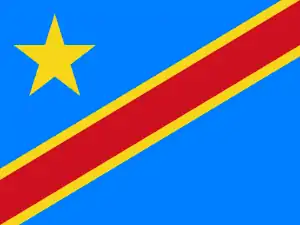 Democratic Republic of the Congo (1966–1971, 1997–present)
Democratic Republic of the Congo (1966–1971, 1997–present)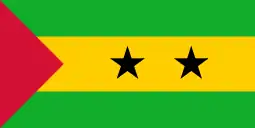 Democratic Republic of São Tomé and Príncipe (1975–present)
Democratic Republic of São Tomé and Príncipe (1975–present) Democratic Republic of Timor-Leste (1975–present)
Democratic Republic of Timor-Leste (1975–present).svg.png.webp) Democratic Republic of Vietnam (1945–1975)
Democratic Republic of Vietnam (1945–1975) Sahrawi Arab Democratic Republic (1976–present)
Sahrawi Arab Democratic Republic (1976–present) Democratic Socialist Republic of Sri Lanka (1978–present)
Democratic Socialist Republic of Sri Lanka (1978–present) Federal Democratic Republic of Ethiopia (1991–present)
Federal Democratic Republic of Ethiopia (1991–present) Federal Democratic Republic of Nepal (2008–present)
Federal Democratic Republic of Nepal (2008–present)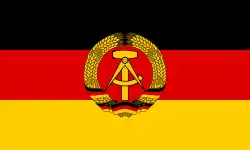 German Democratic Republic (1949–1990)
German Democratic Republic (1949–1990) Lao People's Democratic Republic (1975–present)
Lao People's Democratic Republic (1975–present) People's Democratic Republic of Algeria (1962–present)
People's Democratic Republic of Algeria (1962–present) People's Democratic Republic of Yemen (1967–1990)
People's Democratic Republic of Yemen (1967–1990)
Federal republics
Federal republics are federal states in which the administrative divisions (states or provinces) theoretically retain a degree of autonomy which is constitutionally protected, and cannot be revoked unilaterally by the national government. Federal republics are not unitary states.
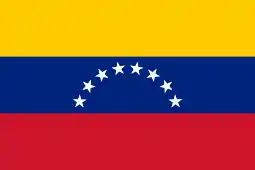 Bolivarian Republic of Venezuela
Bolivarian Republic of Venezuela Bosnia and Herzegovina (since 1991)
Bosnia and Herzegovina (since 1991) Commonwealth of England (1649–1653)
Commonwealth of England (1649–1653) Czechoslovakia: Czechoslovak Socialist Republic (1969–1990), Czech and Slovak Federative Republic (1990–1992)
Czechoslovakia: Czechoslovak Socialist Republic (1969–1990), Czech and Slovak Federative Republic (1990–1992) Federal Democratic Republic of Ethiopia (unitary republic 1974–1994; federal republic since 1994)
Federal Democratic Republic of Ethiopia (unitary republic 1974–1994; federal republic since 1994).svg.png.webp) Federal Republic of Cameroon (1961–1972)
Federal Republic of Cameroon (1961–1972) Federal Republic of Somalia (since August 2012)
Federal Republic of Somalia (since August 2012) Federative Republic of Brazil (since 15 November 1889)[17]
Federative Republic of Brazil (since 15 November 1889)[17] Federal Republic of Germany (since 1918)
Federal Republic of Germany (since 1918) Gran Colombia (Republic of Colombia) (1819–1886), known as Great Colombia from 1819 to 1831, when it included present-day Ecuador, Venezuela and Panama.
Gran Colombia (Republic of Colombia) (1819–1886), known as Great Colombia from 1819 to 1831, when it included present-day Ecuador, Venezuela and Panama. Islamic Republic of Pakistan (since 1956; declaration of the Islamic Republic)
Islamic Republic of Pakistan (since 1956; declaration of the Islamic Republic).svg.png.webp) Second Federal Republic of Mexico (1846–1864)
Second Federal Republic of Mexico (1846–1864) United Mexican States[18] (since 1917)
United Mexican States[18] (since 1917) Federal Democratic Republic of Nepal (since 2007)[19]
Federal Democratic Republic of Nepal (since 2007)[19] Federal Republic of Nigeria (1963–66:1st Republic, 1979–83: 2nd Republic, 1993: 3rd Republic, 1999–present: 4th Republic)
Federal Republic of Nigeria (1963–66:1st Republic, 1979–83: 2nd Republic, 1993: 3rd Republic, 1999–present: 4th Republic) Argentine Republic (since 1852)
Argentine Republic (since 1852) Republic of India (since 26 January 1950)
Republic of India (since 26 January 1950)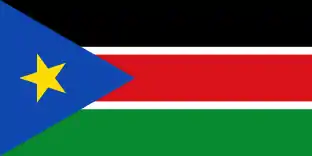 Republic of South Sudan (since 9 July 2011)
Republic of South Sudan (since 9 July 2011) Republic of Sudan (since 1 January 1956)
Republic of Sudan (since 1 January 1956) Republic of Austria
Republic of Austria Russian Federation (since November 7, 1917; up to 1991 it was named Russian Soviet Federative Socialist Republic[20])[21]
Russian Federation (since November 7, 1917; up to 1991 it was named Russian Soviet Federative Socialist Republic[20])[21]%253B_Flag_of_Serbia_and_Montenegro_(2003%E2%80%932006).svg.png.webp) State Union of Serbia and Montenegro (2003–2006)
State Union of Serbia and Montenegro (2003–2006) Switzerland (1848–present), a federal republic but called the Swiss Confederation
Switzerland (1848–present), a federal republic but called the Swiss Confederation Union of Soviet Socialist Republics (1922–1991)
Union of Soviet Socialist Republics (1922–1991) United Provinces of Central America (1823–1840)
United Provinces of Central America (1823–1840) United States of America[22] (since 1789)
United States of America[22] (since 1789) United States of Indonesia (1949–1950)
United States of Indonesia (1949–1950).svg.png.webp) Yugoslavia: Federal People's Republic of Yugoslavia (1946–1963), Socialist Federal Republic of Yugoslavia (1963–1992), Federal Republic of Yugoslavia (1992–2003)
Yugoslavia: Federal People's Republic of Yugoslavia (1946–1963), Socialist Federal Republic of Yugoslavia (1963–1992), Federal Republic of Yugoslavia (1992–2003)
Islamic republics
Republics governed in accordance with Islamic law:
 Islamic Republic of Afghanistan (since 2004)
Islamic Republic of Afghanistan (since 2004) Islamic Republic of Iran (since 1979)
Islamic Republic of Iran (since 1979) Islamic Republic of Mauritania (since 1960)
Islamic Republic of Mauritania (since 1960) Islamic Republic of Pakistan (since 1956)
Islamic Republic of Pakistan (since 1956)
People's republics
People's republics are said to be governed by the people. The name is most often (but not always) used by communist states.
Current people's republics
Former people's republics
.svg.png.webp) Federal People's Republic of Yugoslavia (1946–1963)
Federal People's Republic of Yugoslavia (1946–1963).svg.png.webp) Great Socialist People's Libyan Arab Jamahiriya (1977–2011)
Great Socialist People's Libyan Arab Jamahiriya (1977–2011).svg.png.webp) Mongolian People's Republic (1924–1992)
Mongolian People's Republic (1924–1992) People's Democratic Republic of Yemen (1967–1970)
People's Democratic Republic of Yemen (1967–1970).svg.png.webp) People's Republic of Albania (1946–1976)
People's Republic of Albania (1946–1976)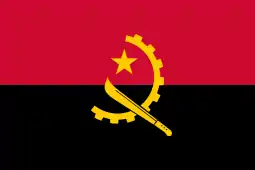 People's Republic of Angola (1975–1992)
People's Republic of Angola (1975–1992).svg.png.webp) People's Republic of Benin (1975–1990)
People's Republic of Benin (1975–1990).svg.png.webp) People's Republic of Bulgaria (1946–1990)
People's Republic of Bulgaria (1946–1990) People's Republic of the Congo (1970–1992)
People's Republic of the Congo (1970–1992).svg.png.webp) People's Republic of Hungary (1949–1989)
People's Republic of Hungary (1949–1989).svg.png.webp) People's Republic of Mozambique (1975–1990)
People's Republic of Mozambique (1975–1990) People's Republic of Poland (1952–1989)
People's Republic of Poland (1952–1989).svg.png.webp) People's Democratic Republic of Ethiopia (1987–1991)
People's Democratic Republic of Ethiopia (1987–1991).svg.png.webp) Romanian People's Republic (1947–1965)
Romanian People's Republic (1947–1965)
Socialist republics
These are republics that use the word "socialist" in their official name.
.svg.png.webp) Armenian Soviet Socialist Republic (1920–1990)
Armenian Soviet Socialist Republic (1920–1990).svg.png.webp) Azerbaijan Soviet Socialist Republic (1920–1991)
Azerbaijan Soviet Socialist Republic (1920–1991).svg.png.webp) Byelorussian Soviet Socialist Republic (1920–1991)
Byelorussian Soviet Socialist Republic (1920–1991) Czechoslovak Socialist Republic (1960–1990)
Czechoslovak Socialist Republic (1960–1990) Democratic Socialist Republic of Sri Lanka
Democratic Socialist Republic of Sri Lanka.svg.png.webp) Great Socialist People's Libyan Arab Jamahiriya (1977–2011)
Great Socialist People's Libyan Arab Jamahiriya (1977–2011).svg.png.webp) Socialist Federal Republic of Yugoslavia (1963–1992)
Socialist Federal Republic of Yugoslavia (1963–1992).svg.png.webp) Socialist People's Republic of Albania (1976–1990)
Socialist People's Republic of Albania (1976–1990).svg.png.webp) Socialist Republic of Romania (1965–1989)
Socialist Republic of Romania (1965–1989) Socialist Republic of Vietnam (since 1976)
Socialist Republic of Vietnam (since 1976) Ukrainian Soviet Socialist Republic (1919–1991)
Ukrainian Soviet Socialist Republic (1919–1991) Union of Soviet Socialist Republics (1922–1991)
Union of Soviet Socialist Republics (1922–1991)
Unitary republics
Unitary republics are unitary states which are governed constitutionally as one single unit, with a single constitutionally created legislature. Unitary states are not federations or confederations.
 Arab Republic of Egypt (since 1953)
Arab Republic of Egypt (since 1953)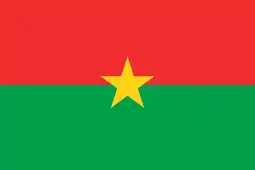 Burkina Faso
Burkina Faso Central African Republic (1958–1976; restored 1979)
Central African Republic (1958–1976; restored 1979) Commonwealth of Dominica
Commonwealth of Dominica Co-operative Republic of Guyana (since 1970)
Co-operative Republic of Guyana (since 1970) Corsican Republic (1755–1769)
Corsican Republic (1755–1769)- Cospaia (1440–1826)
 Czech Republic
Czech Republic Democratic People's Republic of Korea (since 1948)
Democratic People's Republic of Korea (since 1948) Democratic Republic of the Congo
Democratic Republic of the Congo Democratic Republic of São Tomé and Príncipe
Democratic Republic of São Tomé and Príncipe Democratic Republic of Timor-Leste
Democratic Republic of Timor-Leste Democratic Socialist Republic of Sri Lanka (since 1972)
Democratic Socialist Republic of Sri Lanka (since 1972) Dominican Republic (1821–1822, 1844–1861, 1865–present)
Dominican Republic (1821–1822, 1844–1861, 1865–present)- Finnish Democratic Republic (1 December 1939 to 12 March 1940)
 Independent Commune of Franceville (1889)
Independent Commune of Franceville (1889) Gabonese Republic
Gabonese Republic Georgia
Georgia.svg.png.webp) Great Socialist People's Libyan Arab Jamahiriya (1969–2011)
Great Socialist People's Libyan Arab Jamahiriya (1969–2011) Hellenic Republic (First Hellenic Republic (1822–1832)
Hellenic Republic (First Hellenic Republic (1822–1832) Independent State of Samoa (since 2007)
Independent State of Samoa (since 2007) Islamic Republic of Afghanistan (republic since 1973)
Islamic Republic of Afghanistan (republic since 1973) Islamic Republic of Iran (since 1979)
Islamic Republic of Iran (since 1979) Islamic Republic of Mauritania
Islamic Republic of Mauritania Israel (since 14 May 1948)
Israel (since 14 May 1948) Italian Republic (since 1946)
Italian Republic (since 1946) Italian Social Republic (1943–1945)
Italian Social Republic (1943–1945)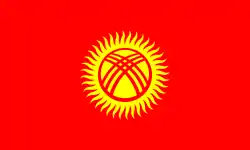 Kyrgyz Republic
Kyrgyz Republic Lao People's Democratic Republic (since 1975)
Lao People's Democratic Republic (since 1975)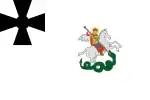 Lokot Republic (1941–1943)
Lokot Republic (1941–1943)- Menton and Roquebrune (1848–1861)
 Mongolia (since 1924)
Mongolia (since 1924) Most Serene Republic of San Marino (since 301)
Most Serene Republic of San Marino (since 301) Oriental Republic of Uruguay
Oriental Republic of Uruguay People's Democratic Republic of Algeria
People's Democratic Republic of Algeria People's Republic of Bangladesh
People's Republic of Bangladesh People's Republic of China
People's Republic of China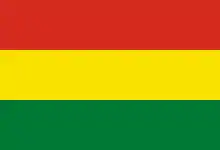 Plurinational State of Bolivia
Plurinational State of Bolivia Portuguese Republic (since 1910)
Portuguese Republic (since 1910) Republic of Acre (1st: 1899–1900; 2nd: 1900; 3rd: 1903)
Republic of Acre (1st: 1899–1900; 2nd: 1900; 3rd: 1903) Republic of Albania (since 1946)
Republic of Albania (since 1946) Republic of Angola (since 1975)
Republic of Angola (since 1975) Republic of Armenia (1st: 28 May 1918; Current: 25 December 1991)
Republic of Armenia (1st: 28 May 1918; Current: 25 December 1991) Republic of Azerbaijan (1st: 28 May 1918; re-established: 18 October 1991)
Republic of Azerbaijan (1st: 28 May 1918; re-established: 18 October 1991) Republic of Benin
Republic of Benin Republic of Botswana
Republic of Botswana Republic of Bulgaria (since 1946)
Republic of Bulgaria (since 1946) Republic of Burundi (since 1966)
Republic of Burundi (since 1966) Republic of Cameroon
Republic of Cameroon Republic of Cape Verde
Republic of Cape Verde Republic of Chad
Republic of Chad Republic of Chile
Republic of Chile Republic of China (Taiwan)
Republic of China (Taiwan) Republic of Colombia (unitary republic since 1886)
Republic of Colombia (unitary republic since 1886)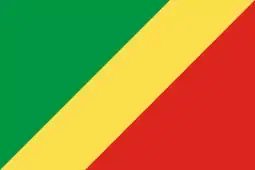 Republic of the Congo
Republic of the Congo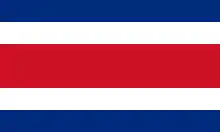 Republic of Costa Rica
Republic of Costa Rica Republic of Croatia
Republic of Croatia Republic of Cuba
Republic of Cuba Republic of Cyprus
Republic of Cyprus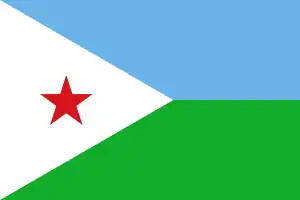 Republic of Djibouti
Republic of Djibouti Republic of Ecuador
Republic of Ecuador Republic of El Salvador (1821–present)
Republic of El Salvador (1821–present) Republic of Equatorial Guinea
Republic of Equatorial Guinea Republic of Estonia (1918–present)
Republic of Estonia (1918–present)- Republic of Ezo (1868–1869)
 Republic of Fiji (since 2011)
Republic of Fiji (since 2011) Republic of Finland (since 1919)
Republic of Finland (since 1919) Republic of Formosa (1895)
Republic of Formosa (1895) Republic of the Gambia (since 1970)
Republic of the Gambia (since 1970) Republic of Ghana (since 1960)
Republic of Ghana (since 1960) Republic of Guatemala
Republic of Guatemala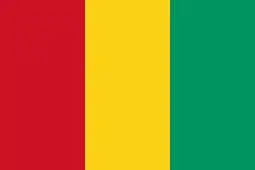 Republic of Guinea
Republic of Guinea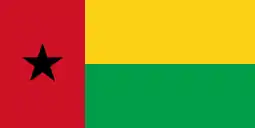 Republic of Guinea-Bissau
Republic of Guinea-Bissau Co-operative Republic of Guyana (since 1970)
Co-operative Republic of Guyana (since 1970) Republic of Haiti (1806–1849; restored 1859)
Republic of Haiti (1806–1849; restored 1859) Republic of Hawaii (1894–1898)
Republic of Hawaii (1894–1898) Republic of Honduras
Republic of Honduras Republic of Hungary (since 1946)
Republic of Hungary (since 1946) Republic of Iceland (republic since 1944)
Republic of Iceland (republic since 1944) Republic of Indonesia (Unitary republic since August 1950)
Republic of Indonesia (Unitary republic since August 1950) Republic of Iraq (since 1958)
Republic of Iraq (since 1958) Ireland (republic since 1949)
Ireland (republic since 1949) Republic of Ivory Coast
Republic of Ivory Coast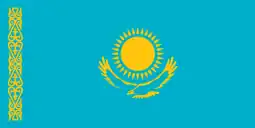 Republic of Kazakhstan
Republic of Kazakhstan Republic of Kenya (since 1964)
Republic of Kenya (since 1964) Republic of Kiribati
Republic of Kiribati Republic of Kosovo (since 2008)
Republic of Kosovo (since 2008) Republic of Korea (since 1948)
Republic of Korea (since 1948) Republic of Latvia
Republic of Latvia Republic of Lebanon (22 November 1943)
Republic of Lebanon (22 November 1943) Republic of Liberia
Republic of Liberia Republic of Lithuania
Republic of Lithuania Republic of Madagascar
Republic of Madagascar Republic of Malaŵi (since 1966)
Republic of Malaŵi (since 1966) Republic of Maldives (since 1968)
Republic of Maldives (since 1968)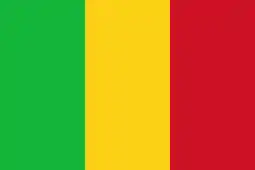 Republic of Mali (since 1960)
Republic of Mali (since 1960) Republic of Malta (since 1974)
Republic of Malta (since 1974) Republic of the Marshall Islands
Republic of the Marshall Islands Republic of Mauritius (since 1992)
Republic of Mauritius (since 1992)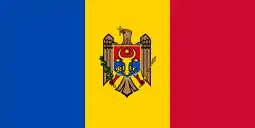 Republic of Moldova
Republic of Moldova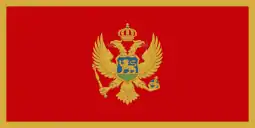 Republic of Montenegro (since 2006)
Republic of Montenegro (since 2006)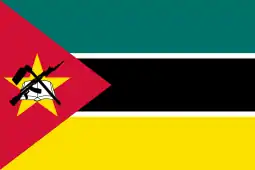 Republic of Mozambique
Republic of Mozambique Republic of the Union of Myanmar (Burma)
Republic of the Union of Myanmar (Burma) Republic of Namibia
Republic of Namibia Republic of Nauru
Republic of Nauru Republic of Nicaragua
Republic of Nicaragua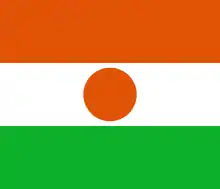 Republic of Niger
Republic of Niger Republic of North Macedonia (since 1991)
Republic of North Macedonia (since 1991) Republic of Palau
Republic of Palau Republic of Panama
Republic of Panama Republic of Paraguay
Republic of Paraguay Republic of Peru
Republic of Peru Republic of the Philippines (1934–present)
Republic of the Philippines (1934–present) Republic of Poland
Republic of Poland.svg.png.webp) Republic of Rhodesia (1970 - 1979)
Republic of Rhodesia (1970 - 1979) Republic of Rwanda (since 1961)
Republic of Rwanda (since 1961)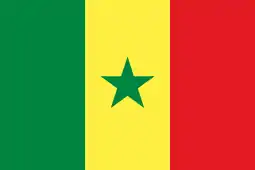 Republic of Senegal
Republic of Senegal Republic of Serbia
Republic of Serbia Republic of Seychelles
Republic of Seychelles Republic of Sierra Leone (since 1971)
Republic of Sierra Leone (since 1971) Republic of Singapore (since 1965)
Republic of Singapore (since 1965) Republic of Slovenia
Republic of Slovenia Republic of South Africa (since 1961)
Republic of South Africa (since 1961) Republic of Suriname
Republic of Suriname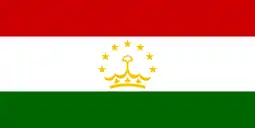 Republic of Tajikistan
Republic of Tajikistan Republic of Texas (1836–1845)
Republic of Texas (1836–1845) Republic of Trinidad and Tobago (since 1976)
Republic of Trinidad and Tobago (since 1976) Republic of Turkey (republic since 1923)
Republic of Turkey (republic since 1923)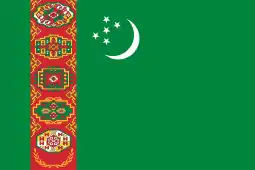 Republic of Turkmenistan
Republic of Turkmenistan Republic of Uganda (since 1963)
Republic of Uganda (since 1963) Republic of Uzbekistan
Republic of Uzbekistan Republic of Vanuatu
Republic of Vanuatu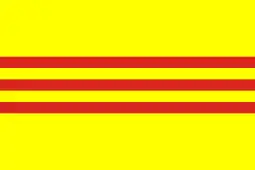 Republic of Vietnam (1955–1975)
Republic of Vietnam (1955–1975) Republic of West Florida (1810)
Republic of West Florida (1810) Republic of Yemen
Republic of Yemen Republic of Zambia
Republic of Zambia Republic of Zimbabwe (1979–present) formerly
Republic of Zimbabwe (1979–present) formerly Romania (since 1947)
Romania (since 1947) Russian Republic (1917)
Russian Republic (1917).svg.png.webp) Slovak Republic (1939–1945)
Slovak Republic (1939–1945).svg.png.webp) Spain (1931–1939)
Spain (1931–1939) State of Eritrea
State of Eritrea.svg.png.webp) State of Muskogee (1799–1803)
State of Muskogee (1799–1803) Syrian Arab Republic
Syrian Arab Republic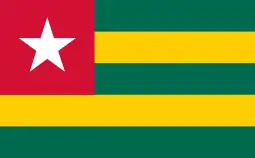 Togolese Republic
Togolese Republic Tunisian Republic (since 1957)
Tunisian Republic (since 1957) Ukraine
Ukraine United Republic of Tanzania
United Republic of Tanzania Vermont Republic (1777–1791)
Vermont Republic (1777–1791)
See also
References
- Jagdish P. Sharma, Republics in ancient India, c. 1500 B.C.–500 B.C., Brill Publishers, 1968, p. 103: "the Licchavis had a council of 9 though the membership of their Assembly numbered 7,707. ... [The Assembly] normally met once a year for important and grave public business."
- Jagdish P. Sharma, Republics in ancient India, c. 1500 B.C.– 500 B.C., Brill Publishers, 1968, p. 82.
- Vaishali – Encyclopædia Britannica
- Andrew Lintott, Violence, Civil Strife and Revolution in the Classical City: 750-330 BC, Routledge, 2014, p. 66.
- "Brief history of Novgorod". waytorussia.net. Retrieved 26 December 2007.
- Carrington, Dorothy, "The Corsican Constitution of Pasquale Paoli (1755–1769)," The English Historical Review, July 1973, pp 481–503
- Van de Water, Frederic Franklyn (1974). The Reluctant Republic: Vermont 1724–1791. The Countryman Press. ISBN 0-914378-02-3.
- "Wee, Small Republics: A Few Examples of Popular Government", Hawaiian Gazette, p. 1, 1 November 1895
- Henry St. Amant Bradsher, Afghanistan and the Soviet Union, Duke University Press, 1983.
- Republic, Oxford English Dictionary, SECOND EDITION 1989
- Laza Kekic, The Economist Intelligence Units Index of democracy, The Economist: The World in 2007
- Wells, H. G. (1 December 2005). A Short History of the World. Cosimo, Inc. ISBN 9781596055858.
- Willoughby, Westel Woodbury; Fairlie, John Archibald; Ogg, Frederic Austin (1918). The American Political Science Review. American Political Science Association.
- Patmore, Glenn (2009). Choosing the Republic. University of New South Wales Press. ISBN 9781742230153.
- "Ελλάς (Πολίτευμα)" [Greece (Form of Government)]. www.anemi.lib.uoc.gr (in Greek). Athens: Pyrsos Publishing. 1934. p. 239. Retrieved 31 August 2018.
Through the Constitution of 1864, constitutional monarchy, or, as it had been described, "crowned democracy", or "democratic monarchy", was consolidated as the form of government in Greece.
- "Σύνταγμα της Ελλάδος" [Constitution of Greece] (PDF). www.hellenicparliament.gr (in Greek). Athens: Hellenic Parliament. 1952. p. 6. Retrieved 31 August 2018.
Article 21: The Form of Government of Greece is that of a Crowned Republic. All powers stem from the Nation and are exercised in accordance with the Constitution.
- "The Formation of the Brazilian Republic in 1889". Archived from the original on 10 November 2016. Retrieved 19 May 2008.
- "Mexico". The World Factbook. CIA. 2007. Retrieved 21 December 2007.
- "Nepal declared republican state – Gorkhapatra Sansthan - State Owned Newspaper". Archived from the original on 26 July 2007.
- Supreme Soviet of the Russian SFSR approved the Law of the RSFSR #2094-I of December 25, 1991 "Name Change for the Russian Soviet Federative Socialist Republic" // News of the Congress of People's Deputies of the Russian SFSR and Supreme Soviet of the Russian SFSR. – 1992. – № 2. – Art. 62
- Article 1 of the Russian Constitution
- "United States". The World Factbook. CIA. 2007. Retrieved 21 December 2007.
- "Korea, North". The World Factbook. CIA. 2007. Retrieved 21 December 2007.
- "Algeria". The World Factbook. CIA. 2007. Retrieved 21 December 2007.
- "Laos". The World Factbook. CIA. 2007. Retrieved 21 December 2007.
- "Bangladesh". The World Factbook. CIA. 2007. Retrieved 21 December 2007.
- "China". The World Factbook. CIA. 2007. Retrieved 21 December 2007.
Further reading
- Robinson, E. W. (1997). The First Democracies: Early Popular Government Outside Athens. Franz Steiner Verlag. ISBN 3-515-06951-8.
External links
 Media related to Republics at Wikimedia Commons
Media related to Republics at Wikimedia Commons